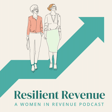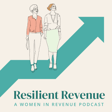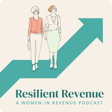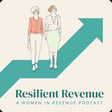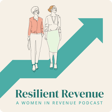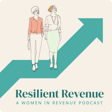Become a Creator today!Start creating today - Share your story with the world!
Start for free
00:00:00
00:00:01

Support Fuels Success: Navigating Careers & Pay Equity with Tracy Eiler
In this special episode of Resilient Revenue, host Kaysen Goranson sits down with Tracy Eiler, CMO at OpenSesame, to discuss key insights from the seventh annual Women in Revenue survey. Tracy shares her thoughts on mentorship, workplace flexibility, gender pay equity, and overcoming discrimination in the workforce. She offers practical advice for women navigating career growth, salary negotiations, and balancing work-life priorities.
Key Topics Discussed:
- Mentorship and Career Growth: Tracy highlights the importance of mentorship and different ways to engage, including Women in Revenue’s huddles and Slack community.
- Workplace Flexibility & Remote Work: Examining the survey findings, Tracy discusses why remote and hybrid work arrangements are critical for many women and how to evaluate career opportunities based on flexibility.
- Gender Pay Gap & Salary Negotiation: Tracy shares strategies for understanding compensation structures, leveraging market data, and effectively advocating for pay equity.
- Discrimination & Workplace Advocacy: Insights into the ongoing challenges women face in professional settings and how to create a supportive and inclusive work environment.
- Resilience in Leadership & Career Progression: The role of self-care, boundary-setting, and supporting other women in fostering long-term career resilience.
Notable Quotes:
- "We are much stronger with resilient women around us. Our networks should be abundant, and giving back is just as important as receiving."
- "Mentorship doesn’t have to be a huge time commitment—it can be as simple as a message in a community forum."
- "Women in revenue roles have the opportunity to earn well, but we need to arm ourselves with compensation knowledge and not shy away from pay discussions."
- "We deliver better results when we create supportive environments for women. Let’s help each other be heard and valued."
- "Resilience is about bouncing back, adapting, and knowing when to walk away from bad situations while keeping our mental health in check."
Resources Mentioned:
- Women in Revenue – WomenInRevenue.org
- Salary Benchmarking Tools: Salary.com, Glassdoor
- Aon Radford Benchmark Data (Compensation insights for various company stages)
- Women in Revenue Slack Community (Join for mentorship, discussions, and support)
Connect with Tracy Eiler:
- LinkedIn: Tracy Eiler
Listen & Subscribe: If you enjoyed this episode, make sure to subscribe to Resilient Revenue and share it with your network. Let us know if you'd like a follow-up episode on salary negotiations and career advancement!
Transcript
Introduction & Podcast Series Overview
00:00:00
Speaker
Welcome to Resilient Revenue, a Women in Revenue podcast series designed to magnify the voices, victories, and valuable insights of trailblazing women in revenue-generating roles.
00:00:12
Speaker
Each episode will showcase stories of resilience, mentorship, and self-advocacy.
Women Breaking Barriers in Tech
00:00:19
Speaker
You'll learn exactly how these remarkable women are breaking barriers, redefining success, and showing us the transformative power of unity within the tech industry.
Guest Introduction: Tracy Eiler, CMO at OpenSesame
00:00:30
Speaker
So join us as we embark on this enlightening journey toward equality and empowerment in the world of resilient revenue.
00:00:40
Speaker
Hey, y'all. I'm Kaysen Goranson, and today we have a special episode of Resilient Revenue. i am joined by Tracy Eiler. She is CMO at OpenSesame.
Tracy Eiler's Career Journey
00:00:49
Speaker
Thank you for joining us today, Tracy.
00:00:51
Speaker
Kaysen, thanks for the invitation. Absolutely. So very excited to have you today. And today's special episode, everyone a little bit different than our normal context, we're going to be digging into the seventh annual survey report from Women in Revenue.
00:01:06
Speaker
and dig into some of our findings. So before we start, Tracy, would love for you to introduce yourself and share kind of the high level of your career path. Sure, and thank you for again for the invitation. Women in Revenue super near and dear to my heart, and I love this audience.
00:01:20
Speaker
My name is Tracy Eiler. I'm a chief marketing officer at a learning company called OpenSesame. We're a SaaS business that's almost at $100 million in revenue now, fully remote company.
00:01:32
Speaker
And I live on the East Coast, relocating from the San Francisco Bay Area after ah many, many years. So I have kind of friends all over the place, all our families on the Eastern seaboard.
Importance of Support Networks & Mentorship
00:01:41
Speaker
Fun fact about me, I started my career as a sales development rep.
00:01:45
Speaker
way long ago, like pre-websites and things like that. But that really gave me the bug for working in sales and marketing and working with customers and figuring out the right way to capture an audience and communicate with them. So it' my journey has been long through many different businesses, all tech. And you know now I'm really at a phase in my life where I want to give a lot back. So I'm excited to be here and talk about this report.
00:02:13
Speaker
Wow, I had no idea you started your career there. there We're going to have to have a side conversation about that at some point. But so digging into the report and really want to start even just basically with the title, Support Fuels Success. the It means to me that As women in the workforce, we are much stronger with resilient women around us.
00:02:42
Speaker
Our boards of advisors, I like to think of it as our network. And our network doesn't have to only be people that we know deeply. it can also be people that are part of a community like Women in Revenue or other communities that we can belong to.
00:02:59
Speaker
And we need to give just as much as we get and being kind of full hearted about an abundant mindset that if we give more, we're going to get back more.
Women in Revenue: Mission & Mentorship Programs
00:03:11
Speaker
That's what that title really means to me.
00:03:14
Speaker
I love that. Very nicely said. So in the report, one of the top challenges for women in the workplace is really the lack of mentorship. Would love to know how women in revenue can find mentors or even be mentors.
00:03:30
Speaker
Yes. Well, you know, the the organization came together more than seven years ago with this express purpose of engaging helping more women advance their careers in revenue roles, sales, marketing, customer success, and in even more and more now and in rev ops type roles.
00:03:49
Speaker
And when we first put the group together, we were wondering, the founders were wondering, like, what do women want? And so we did our first survey. Now we're on our seventh survey.
00:04:01
Speaker
And ever since that very first one case in women say that they want help and support in advancing their careers. And what better way to do that than in mentorship?
Remote Work & Its Impact on Women
00:04:13
Speaker
And the problem with mentorship is think we all have this idea that it's gonna be a huge time commitment, not only for the mentor, but for the mentee. And how do we really do that? And am I am i willing to take on kind of one person and and foster them and usher them this whole time? which is why Women in Revenue has now developed a whole portfolio of mentorship experiences.
00:04:37
Speaker
One of my favorite ones is huddles, which are essentially small groups with a really specific topic with a time-bound interaction, which might be three times over the course of six weeks or something like that.
00:04:52
Speaker
And what's beautiful about that is you're really problem solving together and learning from other women. And, you know, it's completely free to join this organization. Women can go to womeninrevenue.org, sign up.
00:05:03
Speaker
And not only is there the mentor program that has formal pieces to it, the Slack community is amazing. I'm in there all the time, just asking questions, sharing advice, asking advice and so on.
00:05:15
Speaker
And that in an even one message can be a form of mentorship. No, I love that because I think a lot of people think of the traditional sense of mentorship where it needs to be mutually beneficial and both sides need to learn something from it and in clear goals. Where are you going to get out of it Standard meeting cadence and all of that.
00:05:34
Speaker
But it's adjusted. It doesn't have to be. and yeah The other thing I think is that is a misconception is that anybody can be a mentor and you don't have to be someone like me who's in the autumn of their career in order to be, quote, qualified to do that. Right. You can be five years in your career and maybe you are.
00:05:53
Speaker
super talented around how to use AI and marketing programs as an example, right? You can mentor other people with that piece of knowledge. And I think all women should be thinking about what do I have to give that's unique and is going to get me in the room to then also receive. And I think that having that abundant mindset and that giving point of view is a really great way to approach advancing your career.
00:06:18
Speaker
No, absolutely could not agree more. and love that. So one of the things we found in the report was that working from home is the most important benefit when considering a new job or even staying in the role that you have now.
00:06:31
Speaker
We know everyone continues to talk about remote work, hybrid work. They're kind of continuously hot topics. So we'd love to know what advice you have for women who are faced with decisions on returning to office.
00:06:43
Speaker
Yeah, I mean, this is a complicated one, right? Because the there's there were several questions in the report around and of workplace circumstances and the ability to work remotely, whether it's at home or on the road or in another country or whatever it might be, is very, very highly ranked. And you wonder some, you know, I think it's important understand say out loud, why do we think that is? And in fact, there were almost 800 respondents to this um report. And it was something like, think it's 69% of the women who responded said they actually are in a hybrid or remote work situation.
00:07:28
Speaker
It is because women carry more of their fair share of the burden of the home management than men do.
00:07:40
Speaker
It's just true, right? We all know it. We all feel it. Whether you have four-legged children or two-legged children or a spouse or not a spouse or elderly parents or whatever your circumstances are,
00:07:51
Speaker
you are most likely as a woman to be carrying that mental load and kind of the physical burden of the groceries and the doctor's appointments and the kids appointments and, you know, taking the dog to the vet and all of those things.
00:08:04
Speaker
That's why we want to be able to work remotely, right? It's not because we want to stay in our pajamas all day for God's sake. So we all know that least most of the women I know are amazing multitaskers.
00:08:16
Speaker
They are really fearless when it comes to getting the job done and taking care of the other things that they need to do in their lives. That's why we want it, right? So when we are faced with thinking about how am I gonna make money and still manage the rest of my life, it's really tricky. There are especially big companies in big cities that are trying to get that return to the office in place.
00:08:42
Speaker
And let's face it, most of the time it's because of real estate costs. It's not really because of some productivity boost that they think people are going to get. That's been kind of a proven misnomer.
00:08:53
Speaker
So we're going have to choose. And I think we have to look at what kind of companies are requiring a return to office. And, you know, when it's early in your career, off the office workplace is amazing, right?
00:09:05
Speaker
You're in your early 20s. You're right out of college. Like my son is living in New York City. Like he loves being in the office. It's ah the only place you're really going to meet people, get stuff done. and really you know advance as you go along.
00:09:17
Speaker
So things you know kind of change over time. So we have to look at companies from that lens and say, okay, where are there remote opportunities? Where are there hybrid opportunities? How much travel is required? you know Are my hours flexible? I work for a company where a lot of our employees are on the are in the Western time zone of the United States.
00:09:37
Speaker
I usually start my day because I live on the East Coast, maybe 10 in the morning, something like that. But I'm regularly working until seven or so at night, sometimes later. you know, I'm able to do that. I only have four-legged child at home now and a husband, right? So it works for me.
00:09:53
Speaker
So I think we have to come up with our own kind matrices of what's important to us. And if remote work is super important to you, then you got to filter just on that and, you know, and make selections. You're probably not going to be working at JPMorgan Chase in New York City, you know, in a remote world.
00:10:10
Speaker
Like that's just the facts. No, I i mean, i think you nailed and exactly the response and advice that I would give. It's what's that your hierarchy of needs almost?
00:10:21
Speaker
Yeah. What's at the top? Is it the company that matters? Is it the pay? Even to a degree, work flexibility. I'm the opposite of you. I'm in mountain time, but I just naturally i a morning person.
00:10:34
Speaker
So I work East Coast hours. So as even a lot of my coworkers are still working for the day, I'm out walking the dog. because I started well before they woke up. Right. And, you know, isn't there, there's a piece of this too, which I think is more and more normal now where you mentioned walking the dog, doing things like remote walking meetings, right? Things that are not just completely dustbound and over Zoom and being able to do that. And I think when we're looking at new opportunities, testing for that and the interview cycle, like what's the cadence of the work week look like and how do we interact in our, is there normalization around
00:11:09
Speaker
Things about wellness and energy and taking breaks that are supported.
Addressing the Gender Pay Gap
00:11:15
Speaker
No, I agree. It's not. I think we've lumped a lot of topics into remote work, but it also includes flexibility.
00:11:23
Speaker
Exactly like you said, to do what you need to do to live life, whether that's walking a dog, whether it's going to a doctor, working when your brain is kind of on. Mm hmm. That looks like. Mm hmm. Well said.
00:11:34
Speaker
Okay, so i want to dig into a little bit of my maybe more hot or touchy subject here. So just just to set it, it's 2025, to be clear. be clear But we are still seeing in the survey that women are paid less than their male counterparts.
00:11:50
Speaker
So I kind of want to dig into that and really figure out how to reduce gender pay gaps to set the stage for this topic. In a past company, there were some members of the exact same team all doing the same role.
00:12:02
Speaker
They, of course, naturally talked about how much were they getting paid. And The male co-workers on that team were getting paid substantially more. Some of them even had less experience. So that wasn't a factor. They were all in the same city.
00:12:16
Speaker
All of those things. But they felt like they couldn't go to their manager and say like, hey, I know so-and-so makes more than me. So would love to know how you feel about this topic and how you feel like we can start to reduce those pay gaps.
00:12:31
Speaker
Sure. I mean, I think information's power, right? So I think we all owe it to ourselves to understand where we can go to benchmark our own compensation. The report actually has links to many folk many places where you can go. Salary.com is an example. is an example.
00:12:48
Speaker
And none of them are perfect, right? Like we we have to take all of that research data knowing that Every company, ah there are companies are different depending on how large they are, if they're public or private, if they are a let's use a tech startup example.
00:13:07
Speaker
If they're a series ABC, it's going to be way different than if they're a D or an E or if they're private equity owned or if they're venture backed and it's really early, like, We owe it to ourselves to get educated about that. And Women in Revenue has many huddles and education about those components because making $100,000 at a Series A company versus a publicly traded company like Amazon, very different, right? The benefit structures are different. The equity is different.
00:13:34
Speaker
So we need to educate ourselves about the total compensation package, which is not only salary, but also bonus, but also potential of equity, benefits and other things, right? So that is the entire package. We have to make sure we understand that.
00:13:50
Speaker
And then we need to understand what comparables look like. And there are compensation methodologies that companies use. Like I'll just use the example of my company We have only 250 employees.
00:14:03
Speaker
We are VC and PE owned. This year we'll pass a hundred million in annual recurring revenue, just to give you kind of a general idea of our size. And we subscribe to the Aon Radford benchmark data, which many folks on this call will have never heard of, but many, many companies use this data.
00:14:24
Speaker
And where the data comes from is companies like ours subscribe and then basically fill out these big surveys that say for this kind of role with this kind of experience, this kind of grade level, here's the range of pay.
00:14:37
Speaker
And then there's something called percentiles where if you're paid at the 50th percentile, five, zero, 50th percentile means half the people are making more, half the people are making less. and And that's called kind of at market.
00:14:49
Speaker
So that would be the market rate, right? And then there's range that you can go to depending on the grade level. So people should educate themselves about their own company's methods.
00:15:00
Speaker
So in that example, you were talking about where there's a whole bunch of people that have the same job and they're getting paid different things. What my advice to them would be, go to the manager and say, can you explain to me our compensation philosophy?
00:15:11
Speaker
Do we use benchmark data? Can I see that data? How often is it refreshed? Where am I in the range? And then where's my potential? Make it about you and not about, hey, I heard Sarah's making X and Bob's making Y, right?
00:15:28
Speaker
You don't know the exact circumstances of when they were hired or what their performance is or any of those things. You can't make those assumptions. because someone has the same title as you doesn't mean that you shouldn't be paid differently, right? So that's where I think the outside benchmark data and the inside comp philosophy information um really comes into effect.
Networking & Financial Savviness for Women
00:15:50
Speaker
I love that. Full disclosure, I am one of those people who it has never heard that report. I am familiar with percentiles, but I've never heard of that exact report. And I think, honestly, like not to sign you up for another podcast or spinoff, but I think literally going into that and how to have those conversations is something a lot of people are going to want to follow up with you on. Yeah, I mean, we we should do it. And we could even, you know, potentially just, I could show examples of the ranges. In fact, I was just working on this today, looking at the Aon Radford data for my own team. And, you know, looking at, okay, where is everybody? is everyone at market? Because sometimes you'll do an audit like that and find like, oh my gosh, somebody's really pretty underpaid. Like they're coming in at the 25th percentile. We got to make an adjustment for that.
00:16:34
Speaker
But here's what's hard about it, Kacen, as a leader, on an annual basis, I might have about 4% potential raise pool, right? Which isn't a ton of money. It might be in a team of 20 people, about $100,000 that I could use and distribute across the department, right?
00:16:52
Speaker
So I've got a look at each person. I need to see where they are in the range. I need to see how they're performing. and you know And sometimes nobody gets an adjustment and sometimes somebody gets a big adjustment. Like it it really just depends.
00:17:04
Speaker
And you know you'd hope that you're working for a company that is that thoughtful about how they go about things, which is why we need to arm ourselves with as much great benchmark data as possible.
00:17:14
Speaker
The other thing I want to say is I'm really trying to normalize talking about pay. And, you know, i find that people in general are squirrely about bringing up, hey, I make $200,000 a year for XYZ job.
00:17:32
Speaker
What do you make? Or whatever the example would be, right? Right. and comparing notes on what your salary trajectory looked like. Do you have bonus? If you do have bonus, how is it calculated?
00:17:46
Speaker
And, you know, people that are in sales roles or quota carrying roles, very different compensation than the rest of us mere mortals who are usually getting maybe only a salary, maybe a little bit of a performance bonus paid quarterly or or annually.
00:18:01
Speaker
you know Typically in a quota carrying role, you're on a 50-50 plan. You might have an attainment possible of on-target earnings of $200,000. Half of that is your base.
00:18:12
Speaker
The other half of it's your variable. And there's an upside. You're taking more risk, but you potentially have more reward, which is why women in revenue roles are lucrative. And our you know survey shows that even though it's true that women get paid less than men based on and of national data,
00:18:30
Speaker
Women in revenue roles are lucrative. You can make really good money and the women in this survey are making good money in the roles that they've got. So, you know, I feel like within our networks and, you know, I have a small group of women. I think of them as my board of advisors where I will literally say, hey, this is my offer.
00:18:51
Speaker
What do you think? And get really great advice. And remember back to that, there's a portfolio of things that you receive when you are being compensated. And it's not just your base and your bonus potential, but it's also, you know, what is, what are your benefits look like? What's your, what do you have to pay towards those benefits? That's a really highly ranked priority for women and a whole variety of other things. Right. So I think we owe it to ourselves to be financially savvy in this regard.
00:19:20
Speaker
And many women, I was not raised to be savvy about money. It was like, oh yeah, you know, the men make the money and my mom had a part-time job and You know, that was sort of it. So I had to really learn myself through my own network and through, you know, working in tech companies and having great partners and our people and talent teams to really teach me some of the things I have now learned.
00:19:42
Speaker
Yeah, honestly, you hit the nail on the head with it's hard to bring up money sometimes and a lot of people aren't comfortable with it. What would you say to the people who aren't yet fully comfortable saying, hey, this is what my offer is or this is how much I make or even i feel underpaid. What should I do about it?
00:20:00
Speaker
Yeah, I mean, I think you need ah lean on your network, lean. And if you don't have what I call the board of advisors, join a group like Women in Revenue, go to the Slack community. There's an advice comp and benefits channel where you can actually even put an anonymous post in there. Because of course, you know, you don't necessarily want to disclose to a bunch of strangers your information. You don't know who's in there, but you might want to be able to say, hey, this is what I'm being offered in this business.
00:20:27
Speaker
What do you, what do people think? Does this seem fair? Just the other day in the Women in Revenue channel, i somebody posted a question about maternity benefits and the length of time for the benefits and whether it you know it was fair or not.
00:20:39
Speaker
And you know and i just got right back in there and asked questions like, well, tell me about the size and stage of the company. That's a really important question because if you're working at a big business like a Salesforce that's known for really lush benefits,
00:20:52
Speaker
you know, four months full pay, that's kind of normal. But if you're at a startup, and in this particular case, it was like a 50 person startup, you know, kind of the best you can hope for is what the state law requires, which might be six weeks of disability pay, like that's how it goes.
00:21:08
Speaker
So my advice was, Think about what other things would be helpful in that circumstance. For example, a return to work glide path where you're not back after six weeks, full time, full bore.
00:21:20
Speaker
Maybe you're doing part time for another six or something, right? So getting savvy about what levers one can pull And, you know, a lot of times going coming forward to your manager and saying, what more can I get? That manager might be like, i don't know. What do you want?
00:21:37
Speaker
So that's where i feel like we need to have you called it the hierarchy of needs. We need to have our kind of our list of all the things that we are interested in, have an understanding of where we are you know, versus benchmark data.
00:21:49
Speaker
Check that out with our with our networks. And then bring that forward. And I tell you as a leader, when someone on my team comes forward and they've done their homework and they have a bunch of information, I take that really seriously. If they just come forward and say, hey, what's it going to take to get me 150K base? Like, OK, let me tell you what it's going to take.
00:22:07
Speaker
I can tell you right now, you're paid at market. You're paid at the 50th percentile. You're doing a great job, but you're missing these five skills, right? So we have to also think about it as a transaction. Like what else am I bringing to the business that's unique and different and special?
00:22:22
Speaker
And there's great ways for us to differentiate ourselves, right? Systems training, AI training, all kinds of things like that. So You know, i i just feel like education is power and practice is power. And finding a buddy where you can role play with them is super useful and is something I do even today.
Combating Workplace Discrimination & Building Resilience
00:22:41
Speaker
Absolutely. I feel like we keep talking about this all day, but I don't know how much everyone wants to keep hearing us talk about pay. But if you do, please let us know. We will definitely find a subsequent podcast and record that for you guys.
00:22:55
Speaker
So Tracy, i would love to just ask you, other than some of the topics that we have have touched today, was there anything that really stood out to you in the report that you want to make sure we touch on? Oh, let's see You know, i am just struck by the continued experiences that women have with discrimination in the workforce.
00:23:17
Speaker
And in the report year after year, we ask a very open-ended question. Have you experienced discrimination in your career? Would you care to share your story? More than 600 women shared their stories.
00:23:28
Speaker
Some of them are just shocking. Like you think you're watching a ah movie from the 80s, the way that you know women have are experiencing things in the workforce. And i would encourage folks to read that and then Be very mindful of how you're showing up in your company and how you're working your allies.
00:23:48
Speaker
Right. And I can't tell you how many men that I have leaned on you know, to make sure that my voice is heard. Right. Like we've all been so talked over. We've seen people get talked over as just one small example.
00:24:01
Speaker
Watch for that and then help each other. And, you know, if you don't have a women's resource group, employee resource group for women in your company, start one. And, you know, we have a very active one at at Open Sesame and we really help each other quite a lot. So I would say I'm disappointed by continuing to hear these stories, but I am bound and determined to help other women have a better experience.
00:24:24
Speaker
We're going to deliver better results if we do. Absolutely. Could not agree with you more. Okay. So last question i have for you today. end every single podcast with this. So I want to make sure to ask it.
00:24:37
Speaker
But what does resilience mean to you? You know, it is like I guess in its most fundamental level, resilience to me is about bouncing back and being able to adapt, be flexible, keep your optimistic point of view, and knowing when to walk away from bad situations and making sure that you do anything.
00:25:02
Speaker
And how do you do that? You have boundaries, right? You keep track of your own mental health. And then in one of the ways that I, you know, continue to be resilient is by making sure that I'm then giving back to other women. It's one of my love languages. it helps me feel better to know that there's kind of strength around me and that I'm making the world a better place.
00:25:23
Speaker
And, you know, being able to take care of yourself, like it I think it's very... I run myself into the ground often. it just happened to me last night where, you know, the day was too long. The hours were too many. There were too many things coming at me and I could just feel myself fraying.
00:25:38
Speaker
And i think we need to recognize in ourselves those moments and then have our rituals and other habits and things we can do self-care wise to make sure that we are keeping our tank full.
00:25:51
Speaker
So those are some of the things I think are really important when it comes to being resilient. Absolutely. I love that. Thank you for sharing. i always say you can't pour from an empty cup. Well, Tracy, could talk to you all day about, well, anything marketing or anything revenue or keep digging into the survey.
Joining the Women in Revenue Community
00:26:07
Speaker
But really want to thank you for your time today and joining us. Hope to have you again. But for our listeners out there, if you want to connect with Tracy, I recommend that you follow her on LinkedIn and connect to her there.
00:26:20
Speaker
Tracy, thank you so much. Yeah, thank you, K-Stin. I really appreciate it. And that wraps up another episode of Resilient Revenue. These narratives are more than just personal triumphs.
00:26:30
Speaker
They embody the collective journey that we undertake as we strive for a future where every woman, no matter her career stage, location, industry, or demographic profile, has the opportunity to ex excel in her chosen field.
00:26:44
Speaker
Women in Revenue exists because we know amazing things can happen when driven, talented, bottom line oriented women are fired up and collaborating to grow their careers and organizations.
00:26:57
Speaker
We invite you to join our amazing community of 7,000 plus members. If you'd like to become a member for free, head on over to womeninrevenue.org to join today.
00:27:08
Speaker
See you next time on Resilient Revenue.
